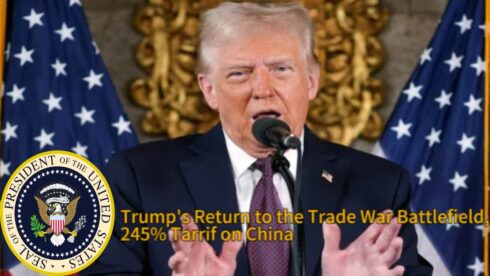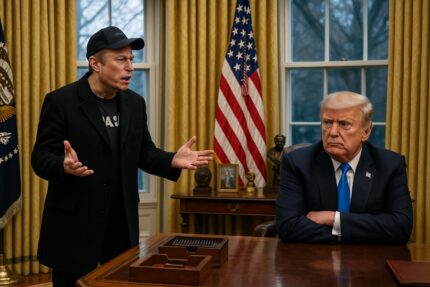President Donald Trump has advocated for a drastic 245% tariff on imports from China, igniting a fierce debate over its potential economic implications. This new policy direction marks a significant escalation in the ongoing trade war between the two superpowers. Trump’s endorsement of such high tariffs comes on the heels of his firm stance on “America First” policies, emphasizing the need for the U.S. to reassert control over its trade deficits and reduce reliance on Chinese manufacturing.
While the new tariffs are expected to disrupt the flow of goods between China and the U.S., experts are questioning whether such an aggressive strategy will yield the desired results. Trump’s approach, which many critics see as reckless, could result in rising consumer prices in the U.S. and lead to a dramatic reshaping of global supply chains. Nonetheless, the former president’s determination to press forward with tariffs reflects his unwavering belief in the protectionist vision he championed during his tenure.
The Economic Fallout: Will U.S. Consumers Pay the Price?
The announcement of the 245% tariff has sparked significant concern about the potential impact on U.S. consumers. Donald Trump’s aggressive trade policy could lead to higher prices for a wide array of everyday goods, including electronics, clothing, and machinery. The ripple effect of increased tariffs on Chinese imports could force American companies to either absorb the costs or pass them on to consumers, resulting in an inevitable price hike.
This economic fallout may have far-reaching consequences for the U.S. economy, especially for the lower and middle-income households who are already struggling with inflation. Experts are debating whether the benefits of reducing the trade deficit and promoting domestic manufacturing will outweigh the negative impact on consumer purchasing power. Trump’s policy, while appealing to his base, could risk alienating millions of American consumers who would bear the brunt of the price increases.
China’s Retaliation: A Tense Diplomatic Showdown
In response to the unprecedented tariff hike, China has vowed to retaliate, threatening to impose its own set of sanctions on U.S. exports. The escalating tension between the two countries has sparked fears of a full-blown trade war that could have devastating effects on global markets. Chinese officials have expressed their strong disapproval of Trump’s heavy-handed approach, accusing the U.S. of undermining international trade norms and damaging diplomatic relations.
The possibility of China retaliating with sanctions on U.S. agricultural products, technology, and even rare earth metals could lead to severe disruptions in global trade. For Donald Trump, this risk is a necessary evil to assert U.S. dominance on the world stage. However, such measures could provoke a cycle of tit-for-tat tariffs that might destabilize key markets, including those for American tech giants and farmers who depend heavily on Chinese exports.
Impact on Global Supply Chains: Reshaping Manufacturing Networks
With the U.S. imposing a hefty 245% tariff on Chinese imports, multinational corporations are now scrambling to reevaluate their supply chain strategies. Trump’s decision to levy such steep tariffs could accelerate the shift away from China as the manufacturing hub of the world. Companies that previously relied on cheap Chinese labor and materials may be forced to look for alternative suppliers in countries like India, Vietnam, and Mexico.
The reorganization of global supply chains comes at a significant cost. Manufacturers face a difficult transition as they attempt to mitigate the impacts of Trump’s new tariffs while maintaining their bottom line. For many businesses, shifting operations away from China might take years to complete, and in the short-term, the cost of production may increase, further complicating efforts to stabilize the global economy.
The Political Implications: Trump’s Return to the Trade War Battlefield
As Donald Trump re-enters the political spotlight, his renewed advocacy for high tariffs on Chinese imports is more than just a policy shift – it’s a calculated move to galvanize his political base. Trump’s stance on China has always been a cornerstone of his “America First” platform, resonating strongly with voters who view China as a major threat to U.S. economic prosperity and national security.
However, this new tariff policy could have a divisive effect on the Republican Party. While some conservatives view the tariffs as a necessary step to reclaim economic power from China, others fear that the trade war could alienate business interests and moderate voters. Trump’s stance could therefore become a defining issue in his political strategy, forcing him to navigate a fine line between appealing to his base and addressing the broader economic fallout.
The Future of U.S.-China Relations: A New Cold War?
Trump’s 245% tariff proposal is likely to have lasting effects on the broader geopolitical landscape. The relationship between the U.S. and China, already fraught with tension, could be pushed to the brink of a new Cold War. As both countries engage in economic and diplomatic maneuvering, the international community watches with bated breath to see how this escalating trade dispute will unfold.
For Donald Trump, this is more than just an economic policy; it’s a statement of American resolve in the face of China’s rise. However, the long-term consequences of this policy are uncertain. Whether the tariffs will achieve their intended goal of reducing China’s economic influence or simply lead to further escalation remains to be seen. As the U.S. and China lock horns, the world may be entering a new era of competition that will redefine global power structures for years to come.














